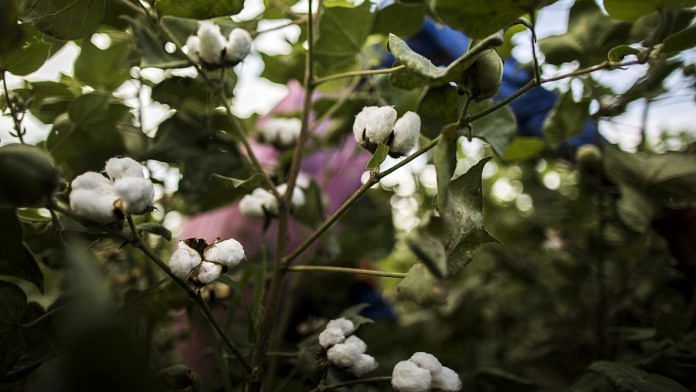Mumbai: At least two more farmers from as many districts in Maharashtra Thursday sowed unauthorised Herbicide Tolerant (HT) cotton on their farms to protest against the embargo on genetically-modified (GM) seeds in India.
This comes three days after a massive protest in Vidarbha’s Akola district, where farmer Lalit Bahale had planted HT cotton seeds on two acres of his farmland in the presence of nearly thousand other farmers as a mark of protest against the moratorium on genetically-modified technology in agriculture.
The two farmers who sowed the HT cotton seeds on their respective farms Thursday had attended the protest Monday at Akoli Jahangir village in Akot taluka of Akola district.
The HT seeds are genetically-modified to tolerate some specific herbicides. So, even as herbicides kill the surrounding weeds, they leave the cultivated crop intact. Farmers have used such unapproved herbicide-tolerant seeds clandestinely to save expenditure on manual labour for weeding.
What makes Bahale and the other two farmers stand out is that they are openly sowing these banned seeds, saying it is their “civil disobedience movement” for technology in agriculture and also challenging the government to take action.
Currently, cotton is the only GM crop that the government has allowed to be sold in India. There were attempts to commercially release Bt Brinjal, a GM variety of the vegetable, but former environment minister Jairam Ramesh imposed a temporary moratorium on it.
There is ample opposition to the introduction of GM food in India with activists, environmentalists and politicians raising fears that it will adversely affect food safety and biodiversity in the country. But proponents of GM technology say it will increase yield, lead to less use of pesticides and thus lower the production cost for farmers.
Also read: Don’t penalise farmers for pro-GM crop protest, address their concerns instead
‘If a technology can help cut costs, why should I not use it?
Mahadev Khamkar, 34, a farmer from Anandwadi village in Ahmednagar district’s Shrigonda taluka, told ThePrint he and a few other farmers got sacks of HT cotton seeds at the protest in Akola and he decided to sow them on a portion of his farmland.
“I have a four-acre farm on which I have always grown regular cotton. A few of my other farmer friends used to plant HT cotton, but I stayed away because I didn’t know enough about it. But over the past few months, I have read a lot of material on it, spoken to experts from organisations like Shetkari Sanghatana and tried to understand if there are any risks. I thought I should at least try it out,” he said.
The Shetkari Sanghatana, an organisation founded by former Rajya Sabha member and farmer leader Sharad Joshi, has always been in favour of GM technology and had backed the Monday protest led by Bahale, one of its members.
The organisation has been gathering farmers’ support for GM technology in agriculture by holding workshops and discussions on the technology across Maharashtra and reaching out to farmers for solidarity through social media forwards.
At Anandwadi, Khamkar sowed two packets of HT cotton seeds on one acre of his farm land.
“All farmers suffer from some or the other problem. Labour is very expensive, we don’t get remunerative market prices. I have Rs 6-7 lakh of debt. I was very depressed. If there is a technology that can help me save costs and increase output, why should I not use it?”
Also read: After ‘uprooting’ crop, Haryana asks Modi govt to probe Bt brinjal contamination case
‘Ultimately, we all have to accept technological innovations’
Like Khamkar, Amol Masurkar, a farmer from Adgaon Budruk village in Telhara taluka of Akola district, also planted HT cotton seeds on three acres of his six-acre farm land in the presence of other farmers.
“Ultimately, we all have to accept technological innovations. We won’t comply with rules if the government is not willing to support us in our use of technology. Farmers in several countries have benefitted (by using technology). Why shouldn’t we benefit?” Masurkar said.
“When I grow regular cotton, I have to spray four different types of pesticides. It not only adds to my cost, but also poses a health risk as we have to do the spraying manually,” the farmer said.
Masurkar added that a number of farmers from the neighbouring villages were present when he planted the HT seeds in the morning. “But a lot of them will still not openly accept its benefits until they see the difference between planting Bt cotton and HT Bt cotton.”
Also read: This is how GM crop Golden Rice could solve Vitamin-A deficiency in Asia




I’d like to add that GM crops are extremely safe, in addition to being productive, see http://swarnabharat.in/gm for details